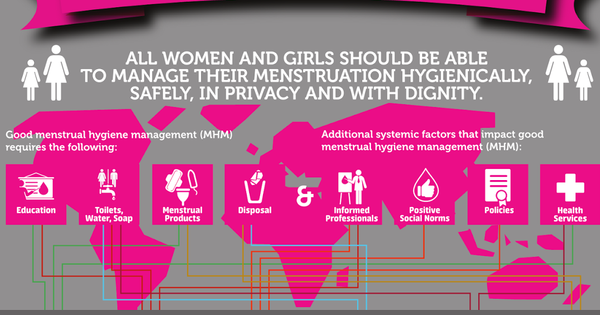AWAG has initiated a ‘health and hygiene project’ in the villages of Radhanpur, Gujarat to raise awareness on reproductive and menstrual health along with entrepreneurial training for marketing of sanitary pads and other hygiene products.
Coming from a big city, I have never much pondered upon menstruation being a taboo for most of the Indian women. It came to me as a surprise when I became a part of AWAG and learnt about the various activities that the organisation conducts at the village level with grass root women.
Can you imagine unhygienic materials being used instead of sanitary napkins during menstruation? Unfortunately, It’s the reality of more than 8 out of 10 Indian women during menstruation. A research study conducted by AC Nielsen and Plan India survey (2011) revealed that only 12% of menstruating Indian women use sanitary napkins. A shocking 88% of total population rely on traditional practises such as using old fabrics, sand, saw dust, dry leaves and newspapers during periods. Not to ignore the number of vaginal infections these cultural practises lead to, making women susceptible to a number of diseases such as cancer of cervix, urinary tract infection and removal of the uterus.
In addition, there are a number of cultural myths being followed by menstruating women in India. Here are some of the myths tagged along with menstruation:
- 1) Period blood kills crops and rusts iron – It is believed that menstrual blood contains a poison called ‘menotoxins’ which kills the crops. No, it is just shredding of your uterine walls made up of one’s own blood.
- 2) Sex on your period causes deformed babies – It is possible to get pregnant on your period days but no evidence to support deformed babies. It could be possible that it was made up to avoid stains on the sheets.
- 3) You can’t go swimming during periods – It is believed that swimming increases cramps. Not true, water has a pain relieving property which might actually help women with the menstrual cramps.
- 4) Slipping some of the menstrual blood into a man’s food or drink will cause him to madly fall in love with you – a common myth amongst Asian and African cultures. Not true again. The possibility of him running away from you is for sure though!
- 5) Other people can tell that you have your period – no, not unless you stain your clothes and people can see! 23% of Indian girls skip school at least 5 days every month during menstrual season as they consider it a curse.
Such cultural myths around menstruation give women a sense of being impure and inferior during that time of the month. Taboos have a negative impact on a women’s emotional state and lifestyle practises causing detrimental effects on health. Poor protection and limited knowledge of puberty and reproductive health stigmatise the phenomenon.
Why is there such a taboo to guide women on naturally occurring changes during puberty? Why is it still considered a ‘hush hush’ affair when it happens every time of the month?
Raising awareness is extremely important to break these traditional myths. Awareness induces confidence in women to openly talk and clarify doubts around it rather than blindly following the traditional practices. AWAG’s ‘health and hygiene’ program aims to shed light on this burning issue. To learn more about this project and make a donation, please follow the link – http://www.globalgiving.co.uk/projects/training-130-women-youth-health-leaders-in-gujarat/
I am happy to support this incredible cause and you should do it too!
Reference –
Sengupta, H (2014) Recasting India: How entrepreneurship is revolutionizing the world’s largest democracy.

